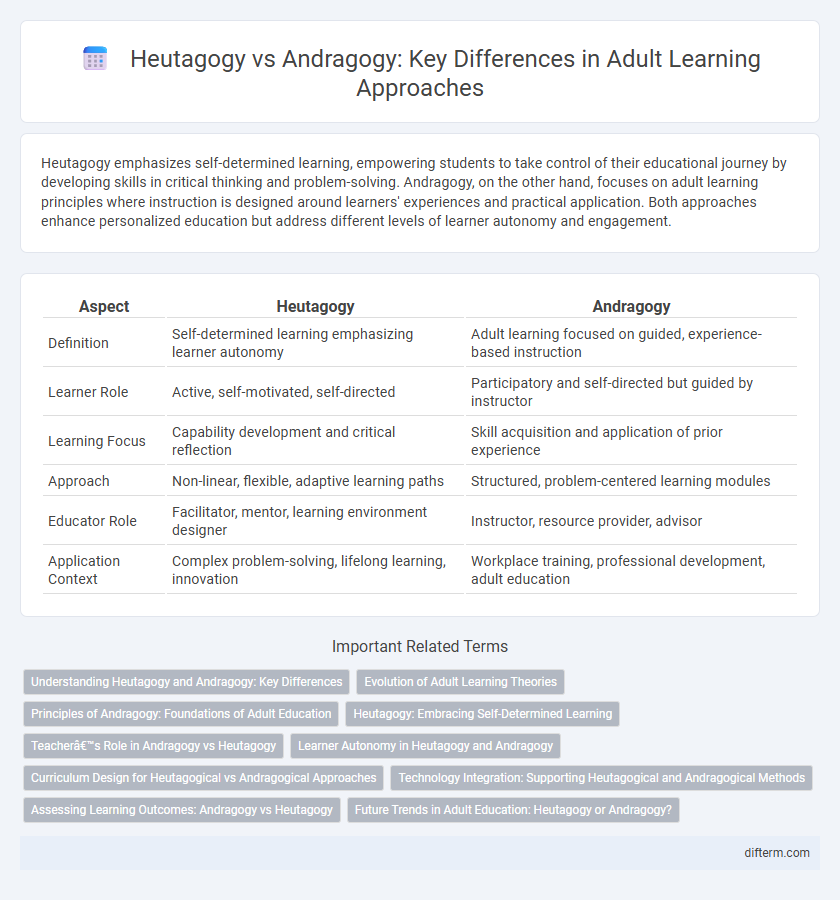Heutagogy emphasizes self-determined learning, empowering students to take control of their educational journey by developing skills in critical thinking and problem-solving. Andragogy, on the other hand, focuses on adult learning principles where instruction is designed around learners' experiences and practical application. Both approaches enhance personalized education but address different levels of learner autonomy and engagement.
Table of Comparison
| Aspect | Heutagogy | Andragogy |
|---|---|---|
| Definition | Self-determined learning emphasizing learner autonomy | Adult learning focused on guided, experience-based instruction |
| Learner Role | Active, self-motivated, self-directed | Participatory and self-directed but guided by instructor |
| Learning Focus | Capability development and critical reflection | Skill acquisition and application of prior experience |
| Approach | Non-linear, flexible, adaptive learning paths | Structured, problem-centered learning modules |
| Educator Role | Facilitator, mentor, learning environment designer | Instructor, resource provider, advisor |
| Application Context | Complex problem-solving, lifelong learning, innovation | Workplace training, professional development, adult education |
Understanding Heutagogy and Andragogy: Key Differences
Heutagogy emphasizes self-determined learning, where learners take control of their educational journey, fostering autonomy and critical thinking. Andragogy focuses on adult learning principles, highlighting the importance of experience, motivation, and practical relevance in the learning process. Understanding these key differences is essential for designing effective educational strategies tailored to diverse learner needs.
Evolution of Adult Learning Theories
Heutagogy represents the evolution of adult learning theories by emphasizing self-determined learning where learners take full control of their educational processes, contrasting with andragogy's focus on facilitating learning through guided instruction tailored to adults' experiences. This shift highlights increased learner autonomy and the development of metacognitive skills, reflecting changes in workforce demands and technological advancements. As adult education evolves, heutagogy integrates complexity and adaptability, supporting lifelong learning in dynamic environments.
Principles of Andragogy: Foundations of Adult Education
Andragogy is grounded in principles that emphasize the self-directed nature of adult learners, recognizing their need for autonomy and practical application of knowledge. It prioritizes experiential learning, where adults draw on their prior experiences to build new skills, and focuses on problem-solving rather than rote memorization. These foundations support personalized learning paths, making education more relevant and effective for adult learners.
Heutagogy: Embracing Self-Determined Learning
Heutagogy emphasizes learner autonomy by promoting self-determined learning where individuals actively control their educational paths and develop critical thinking skills. It contrasts with andragogy by focusing more on capability development and double-loop learning, enabling learners to adapt and apply knowledge in complex, real-world situations. This approach fosters lifelong learning habits and enhances personal and professional growth beyond traditional curriculum boundaries.
Teacher’s Role in Andragogy vs Heutagogy
In andragogy, the teacher functions as a facilitator who guides adult learners through structured learning experiences based on their existing knowledge and practical goals. Heutagogy shifts the teacher's role to that of a mentor or coach, empowering learners to take control of their own learning paths and develop self-determined strategies. This evolution highlights a move from teacher-led instruction to learner autonomy, emphasizing critical reflection and capacity building.
Learner Autonomy in Heutagogy and Andragogy
Heutagogy emphasizes learner autonomy by encouraging self-determined learning where individuals take full control of their educational paths, fostering skills like critical thinking and self-reflection. In contrast, andragogy supports learner autonomy through guided instruction tailored to adult learners' experiences, promoting practical application and problem-solving within a structured framework. Both approaches prioritize adult learning but differ in the level of independence granted, with heutagogy pushing for greater learner ownership and andragogy balancing autonomy with instructor facilitation.
Curriculum Design for Heutagogical vs Andragogical Approaches
Heutagogical curriculum design emphasizes learner autonomy, promoting self-determined learning paths and reflective practices to develop metacognitive skills. Andragogical curriculum focuses on facilitating experiential learning, leveraging prior knowledge and practical application relevant to adult learners' needs. Tailoring curriculum to heutagogy fosters adaptability and lifelong learning, while andragogy prioritizes structured guidance and skill acquisition within real-world contexts.
Technology Integration: Supporting Heutagogical and Andragogical Methods
Technology integration enhances heutagogical methods by promoting self-directed learning through digital resources, online collaboration tools, and adaptive learning platforms that empower learners to navigate their educational paths independently. In andragogy, technology facilitates practical application and experiential learning by offering simulations, real-time feedback, and access to professional networks, supporting adult learners' immediate relevance and problem-solving needs. Both approaches benefit from technology that tailors content delivery, fosters critical thinking, and encourages continuous skill development in dynamic learning environments.
Assessing Learning Outcomes: Andragogy vs Heutagogy
Assessing learning outcomes in andragogy primarily involves measuring knowledge acquisition and skill application through structured evaluations and performance assessments tailored to adult learners. Heutagogy emphasizes self-determined learning, requiring assessment methods that capture learner autonomy, capability development, and reflective practices beyond traditional testing. Both approaches prioritize practical relevance, but heutagogical assessments integrate metacognitive evaluations to support continuous learner growth and adaptability.
Future Trends in Adult Education: Heutagogy or Andragogy?
Future trends in adult education increasingly emphasize heutagogy, which promotes self-determined learning and adapts to digital technologies, fostering learner autonomy and personalized experiences. Andragogy, traditionally focused on adult learners' needs and practical application, remains relevant but is evolving to incorporate more flexible, learner-centered approaches. Emerging educational models blend heutagogical principles with andragogical strategies to enhance engagement and skill development in diverse adult learning environments.
Heutagogy vs Andragogy Infographic

 difterm.com
difterm.com